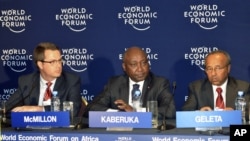The pace of change across Africa may be about to accelerate, driven by advances in technology that are just breaking onto the scene. The World Economic Forum on Africa in Addis Ababa provides a peek at the coming transformation.
Africa's big guns attended the forum. Seven heads of state were at the top of a long list of luminaries such as former United Nations Secretary-General Kofi Annan.
But the big ideas were coming from relative unknowns, names like Ory Okolloh, Bright Simons and Omobola Johnson, who were featured speakers at a session on Africa's innovators.
Young developers driving change
Okolloh, policy manager for Google South Africa, explained what Google is doing with a group she called “young developers."
"We have set up something called Google Tech User Groups in more than 30 countries like DRC [Democratic Republic of Congo], Cote d'Ivoire [Ivory Coast]. Establishing a footprint, and giving these developers who are doing what they were doing anyway, but without the resources, without some of the skills around how to improve an application for instance, or to better improve a user interface [or] how to get an app to market," said Okolloh.
Bright Simons is president of Mpedigree Network in Ghana. Concerned about the deaths of 2,000 people a day from fake medical products, his firm came up with a way to help consumers know that the medicines they buy are genuine.
"We've been trying in about six countries in Africa to create a mechanism where manufacturers and distributors of medicine can implant a unique ID, identification tags on each pack of medicine, so when the consumer buys the medicine, that comes with a free text message or a free MMS, using a cameraphone to verify instantly whether the particular medicine they are holding is likely to kill them or save their lives," he said.
Major wave of innovation on horizon
Omobola Johnson, Nigeria's minister of communications technology, said her government is working with the tech giants to allow people with good ideas the chance to do great things.
"It's the responsibility of us as policy makers to look at, 'How do we create that environment that allows those innovators to thrive and succeed?' Google is working with us, creating islands of sanity where people can think, and taking ideas into reality and commercialization," she said.
Okolloh said the online world is helping to break down social barriers that have prevented some Africans from achieving success.
"It frees people from waiting for someone to make things happen for them, which has been a big challenge for young people especially. And, that's why they're gravitating to technology so much," she said. "It's the one space where you don't have to come from the right family, or the right tribe, or have the right connection to make it. And it's an area old people don't understand, so they can't dominate it."
Okolloh admits that, as a woman, she also loves technology because it neutralizes gender stereotypes.
"I'm not sure I'd be as successful as I am as a woman in a profession other than in technology," she said. "Because it tends to be a bit neutral. If you have the tools, if you can code, it's a lot more sort of merit, and recognizes talent."
These innovators say that in as little as five years, a combination of fresh ideas and demographic imperatives will begin to revolutionize Africa. As several participants at the forum noted, half of the continent's population is under 30, and they are demanding change.








